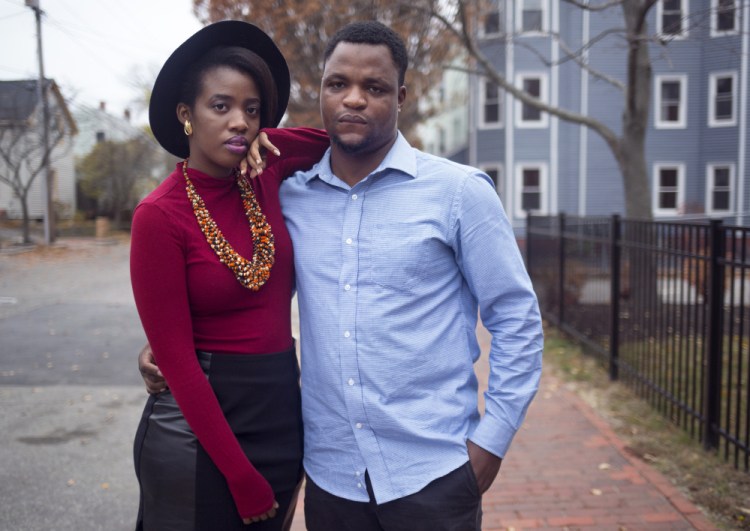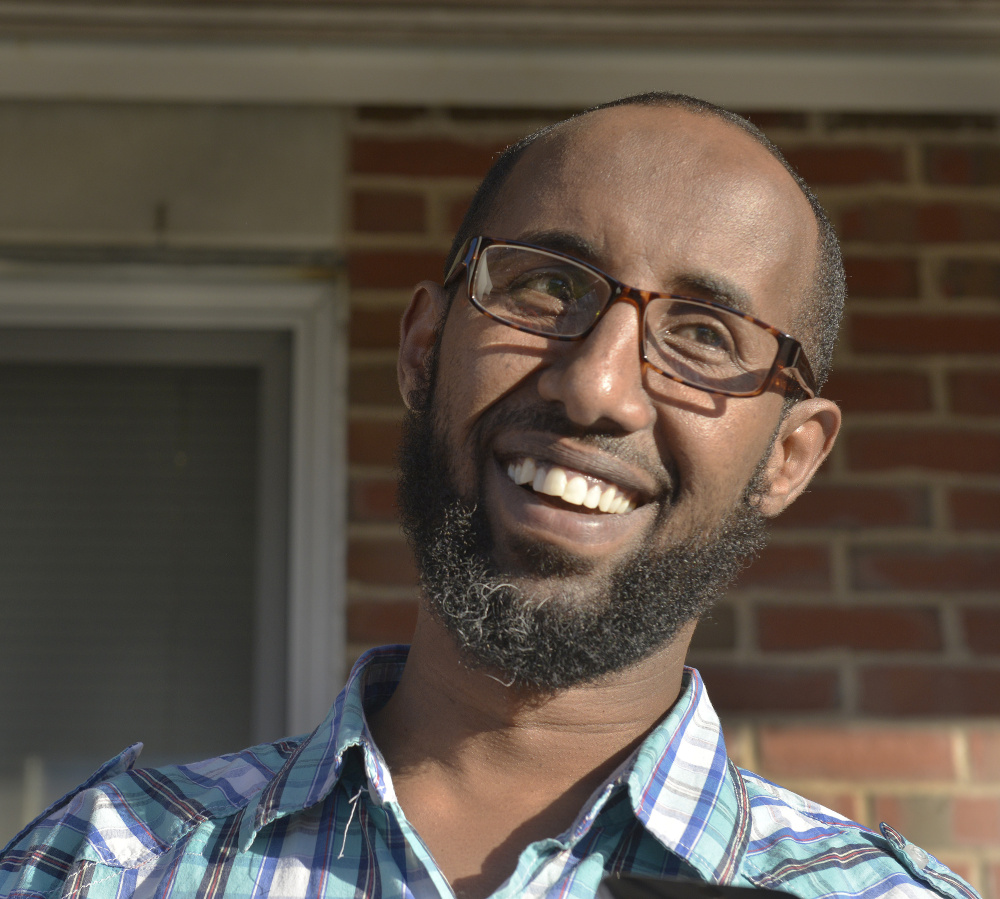When she heard that Donald Trump had won the presidential election, Judicaelle Irakoze started worrying about a worst-case scenario.
Irakoze, 21, came to Maine after fleeing Burundi in 2013 and was granted political asylum in April. But after more than a year of anti-immigrant campaign rhetoric from Trump and his supporters, Irakoze is worried that asylum status won’t protect her.
“His words created fear in our hearts,” Irakoze said.
“Maybe he didn’t mean it, but I am very worried that I will be sent to Africa or something like that. I realize I have legal status, but I think, he is the president, maybe he can change that, I don’t know,” she said. “It is really uncertain. We are waiting for him to give a speech at the White House to comfort us immigrants, to tell us that we are still OK, that we have a place in America.”
Since Trump’s election, immigrant legal advocates say they have been swamped with calls from clients who, like Irakoze, are worried about the future. Some of the immigrants are in the midst of seeking asylum, a process that can take three years because of a federal backlog.
“Our clients are genuinely fearful,” said Anna Welch, head of the Refugee and Human Rights Clinic at the University of Maine School of Law. “I think the fear is (that) at all levels they could face deportation, even if they have legal status.”
Welch said she has too little information to provide reassurance.
“The message should be that we don’t know what is to come and we don’t want to create panic, but there will be some changes,” Welch said.
Some community leaders in Maine, including Portland Mayor Ethan Strimling, have tried to calm fears within Maine’s refugee and immigrant community by issuing statements that they remain welcome.
There is still a lot of uncertainty about what action President-elect Trump will take regarding immigrants, both those who are living here illegally and those who have legal status.
Trump told CBS-TV’s “60 Minutes” on Sunday that his administration planned to deport or imprison up to 3 million immigrants who have criminal records. In 2013, the U.S. Department of Homeland Security estimated there were 1.9 million “removable criminal aliens” in the country, a group that includes many people who have legal status such as green cards.
Researchers estimate that there are 690,000 people living in the U.S. illegally who have felony or serious misdemeanor convictions. The Obama administration has for years had a policy of prioritizing people with such convictions for deportation.
DEPORTATION THREAT SOFTENED
Trump’s stated position Sunday was somewhat softer than some of his campaign rhetoric. He made headlines by calling Mexican immigrants rapists and drug dealers, and proposing to ban Muslims from the U.S., among other statements. A central campaign promise was to build a wall on the U.S.-Mexico border and order the mass deportation of millions of people living in the country illegally.
Initially, Trump said he intended to deport an estimated 11 million immigrants living here illegally, but Monday he said his administration hasn’t decided on action against the large majority of those immigrants who have no criminal records.
At an August rally in Portland, Trump suggested a link between crime in Maine and the state’s Somali immigrant community. The remarks were denounced by city officials and community members at a mass rally at Portland City Hall.
Despite the tone of the campaign, Trump picked up support from some new Americans, including Irakoze’s friend, Follyvi Alognon.
Alognon, 27, said he came to the U.S. from Togo more than 15 years ago and got citizenship in 2012. Last week, he voted for Trump.
“It’s inspiring. Everyone was against him and he fought his way up,” Alognon said. Trump’s rhetoric was tough, but Alognon said it targeted people who shouldn’t be in the country, not people who immigrated legally and stayed out of trouble, like he did.
“The people who came here illegally, for them it is not good,” he said.
DIFFERENT CATEGORIES OF IMMIGRANTS
Uncertainty about Trump’s immigration policy is fostering fear among her clients, said Susan Roche, director of the Immigrant Legal Advocacy Project in Portland.
“Unfortunately, we are really not going to know what is going to happen until the new administration has started,” Roche said.
About 3,000 refugees were resettled by the federal government in Maine from 2010 to 2015, according to Catholic Charities, the agency that administers local resettlements. Refugees are different from asylum seekers, who typically arrive in the country with a temporary visa and then apply for the right to stay and avoid political persecution in their home countries. There are about 1,000 asylum seekers in the Portland area, and Roche’s organization represents about 200 clients, she said.
One group believed to be at particular risk includes people who were children when they were brought into the country by their parents without authorization. They were given legal status through the Deferred Action for Childhood Arrivals program approved by an executive order of President Obama. Trump has said he will reverse that order. Dozens of people in Maine qualified under the program, Roche said.
At Catholic Charities, it’s business as usual, said spokeswoman Judy Katzel.
“At this point, we have decided it is not worth speculating what will happen next year in the Trump administration,” she said. “While there may be some concerns in the refugee community, we really believe that most Mainers understand that refugees resettling in Maine come here to seek peace, community, stability and the ability to start new lives far, far away from the horrific conditions in their home countries.”
Catholic Charities already is dealing with a challenge from Republican Gov. Paul LePage, who told the Obama administration two weeks ago that Maine would no longer administer the federal refugee resettlement program because he did not trust the government to properly vet refugees from Syria.
Katzel said refugee organizations are still operating in 13 states that have pulled out of the federal program.
CIVIC LEADERS TRY TO QUELL FEAR
Civic leaders have been trying to quell post-election fear, especially after reports of violence and racial harassment in other states.
In Lewiston, home to a large Somali community, Mayor Bob Macdonald released a statement Monday saying harassment of any members of the community would not be tolerated. Interim Police Chief Brian O’Malley said his department received no reports of harassment, and the Portland Police Department also has not received harassment reports.
In Portland, Strimling released a statement Tuesday seeking to reassure immigrants and explain that Portland is not among the sanctuary cities that could face sanctions from the Trump administration. Sanctuary cities are places where undocumented immigrants are protected because city agencies do not help prosecute them. Strimling said Portland’s policy is that police will not ask people about their immigration status unless ordered by a court, but will cooperate with federal officials.
“I want to reassure our residents that they are welcome here and we will not tolerate hate crimes, bigotry or intolerance,” Strimling said. “And we will not participate in any witch hunts that intimidate our residents.”
‘THIS IS NOT A TOTALITARIAN REGIME’
Trump’s victory surprised many, and leaders in the immigrant community have been trying to cool tensions.
Maxwell Chikuta, who came to Maine from the Democratic Republic of Congo in 2003 and became a citizen, said he has tried to reassure asylum seekers who are terrified they will be deported.
“I was like, ‘You know guys, come on, it is not going to happen like that,'” Chikuta said. “All I know is that if you keep yourself clean, you are not criminal, you do what they ask you to do, you are going to be in this country if you are following the rules.”
Mahmoud Hassan, president of the Somali Community Center of Maine, said he has been speaking in mosques and community centers since the election, trying to play down fear of a Trump administration.
“We are trying to do all our best to tell people this is a constitutional democracy, we have checks and balances to counter executive branch policies, we have courts for legal redress,” Hassan said. “We have to not be afraid about anything happening. This is not a totalitarian regime.”
Comments have been disabled on this story because of personal attacks.
Comments are not available on this story.
Send questions/comments to the editors.



